The Night Watch, BBC Two | reviews, news & interviews
The Night Watch, BBC Two
The Night Watch, BBC Two
Efficient adaptation misses the crashing chords of romantic Rachmaninov
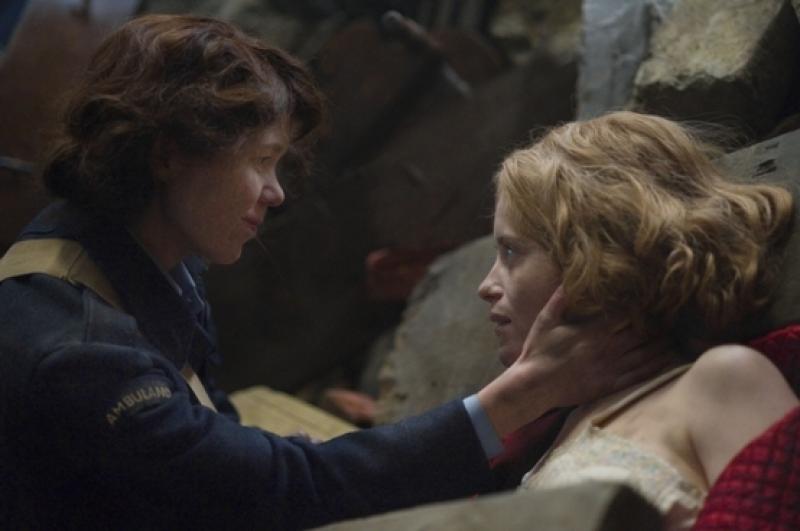
Sarah Waters’s highly praised novels have marched from the page to the screen with regimental regularity and no apparent sacrifice in quality. Tipping the Velvet and Fingersmith, with their big Victorian brushstrokes, were built for television no less than Dickens is. With The Night Watch, adapted last night, her subject was still the love that dare not speak its name. But two things were different.
As usual with popular quality fiction, those with a strong loyalty to the original will be posting their objections in the comments box. But this was an efficient filleting by Paula Milne. All the important marks were hit: the terror of discovery for young gay men and women, somewhat alleviated by wartime when everyone was too busy licking Hitler to keep an eye on the same-sex fumblings among pert young flatsharers. Being squeezed into 90 minutes, some of the more sinuous and serpentine coils of Waters’s plotting no doubt had to be sacrificed in the interests of narrative drive. But something of the structural ambition was preserved as, like Harold Pinter’s portrayal of a love triangle in Betrayal, the story came by its revelations of motive by travelling backwards in time, in this case from 1947 via 1944 and thence to 1941.
Maxwell Martin was cheekily got up to look like her character's creator
Thus in the first section we witnessed the relationship of pretty, shy Helen (Claire Foy) and her more vampish lover Julia (Anna Wilson-Jones) run aground on Helen’s jealousy while Kay (Anna Maxwell Martin) mooched mannishly about London with a very long face, the explanation for which was found in 1944. Director Richard Laxton's clever device for spooling back in time was to rifle at high speed through snapshots of the scenes about to unfurl. Thus three years earlier, now in the midst of the ferocious rain of V1s and V2s, we watched Helen falling for Julia, who happened to be the ex of her current lover Kay, an ambulance worker we in due course saw rescuing Helen from the rubble in the Blitz in 1941and so igniting their doomed romance. Meanwhile, two parallel stories told of troubled siblings. Viv (Jodie Whittaker, pictured below) was seduced into an affair with a married soldier which led to a highly gruesome abortion and slow romantic disillusionment, while her brother Duncan (Harry Treadaway), a homosexual banged up in the Scrubs after his lover committed suicide, grappled with the shame of his homosexuality in a prison heaving with poufs and conchies.
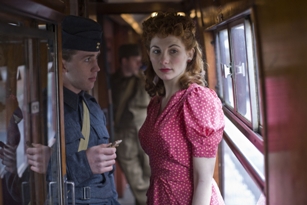 In a drama about forbidden love and loss in buttoned-down wartime Blighty, you slightly missed the swoops and crashes of romance such as Rachmaninov brought to Brief Encounter. What we saw of London was suitably clad in gloomy greys and browns but for the pair of racy red pyjamas gifted by Kay to Helen (and of course the bits and pieces of female flesh obligatorily/obligingly found in Waters adaptations). As ever with a drama which tried to fill a large canvas, the television budget did its asphyxiating work. Bombarded London burned and smoked modestly. Kay hunted for the body of Helen, presumed buried at the bottom of a heap of miraculously undamaged chairs (but in fact out trysting with Julia). Much of the artistry was in the acting – Maxwell Martin, yes, cheekily got up to look like her character's creator, but also Whittaker and Foy as women looking for love in the wrong places. In the film’s most novelistic still, Treadaway lay in his prison bunk as an arm dropped down limply from above, an ambiguous temptation to play.
In a drama about forbidden love and loss in buttoned-down wartime Blighty, you slightly missed the swoops and crashes of romance such as Rachmaninov brought to Brief Encounter. What we saw of London was suitably clad in gloomy greys and browns but for the pair of racy red pyjamas gifted by Kay to Helen (and of course the bits and pieces of female flesh obligatorily/obligingly found in Waters adaptations). As ever with a drama which tried to fill a large canvas, the television budget did its asphyxiating work. Bombarded London burned and smoked modestly. Kay hunted for the body of Helen, presumed buried at the bottom of a heap of miraculously undamaged chairs (but in fact out trysting with Julia). Much of the artistry was in the acting – Maxwell Martin, yes, cheekily got up to look like her character's creator, but also Whittaker and Foy as women looking for love in the wrong places. In the film’s most novelistic still, Treadaway lay in his prison bunk as an arm dropped down limply from above, an ambiguous temptation to play.
“Hitler would have you lot strung up by your tits,” one ambulance worker advised Kay, perhaps because she’d thumped him three years earlier. So long as his bombs fell on London, littering the streets with the body parts of children, Waters’s ladies were fetchingly free to play the field. Kay’s optimism that victory would bring not just peace but also equal rights for women was, of course, not borne out. In the script’s hasty final return to 1947 to tie up a bow or two, it was two heterosexual characters who found each other and the promise of happiness, while the gay men and women were consigned by the forces of history, and the resumption of the natural order, to roam once more in the shadows, awaiting their turn. As Duncan was eyed up on a train while Helen was expelled from Julia's life and Kay unpacked boxes in her flat alone, the climactic suggestion was that the future would be a lot easier for the boys than the girls.
CLAIRE FOY’S CV
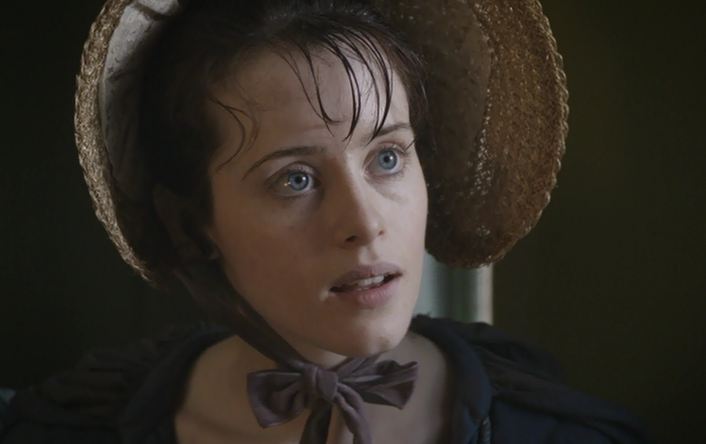 Little Dorrit (2008). “Dickens did just see her as homely, angelic and giving. I looked on her as a sort of a carer whose parent or child is ill. That made her believable in my head.”
Little Dorrit (2008). “Dickens did just see her as homely, angelic and giving. I looked on her as a sort of a carer whose parent or child is ill. That made her believable in my head.”
Upstairs Downstairs (2010-12). Lady Persephone, posh little brown shirt based on the Hitler-obsessed Unity Mitford, tops herself in a dramatic exit from the second series.
The Night Watch (2011). Foy plays a troubled lesbian toy girl in an adaptation of Sarah Waters’ novel about heartache in the Blitz (pictured below with Anna Maxwell Martin)
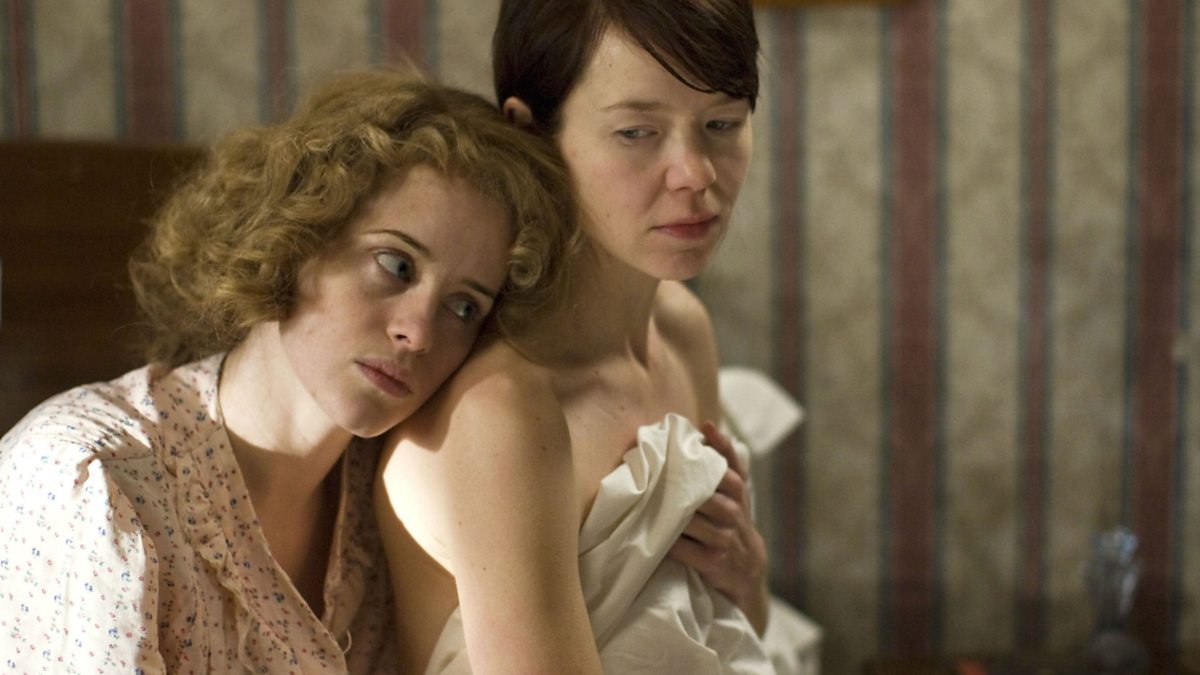 Wreckers (2011). Foy is wife to Benedict Cumberbatch in fraught low-budget Fenland drama
Wreckers (2011). Foy is wife to Benedict Cumberbatch in fraught low-budget Fenland drama
The Promise (2011). In Peter Kosminsky’s epic historical drama, Foy plays Erin Matthews, an 18-year-old obsessed with investigating the story of the British soldiers serving in Palestine in the years before our ignominious exit. “I just recognised quite a lot of things about me when I was her age.”
White Heat (2012). Foy is a feminist child of the Sixties who grows up to become Juliet Stevenson.
Hacks (2012). Guy Jenkin comedy inspired by the hacking scandal, in which Foy's feral tabloid editor Kate Loy is not remotely based on to Rebekah Brooks. A rare comic outing for an actress with natural funny bones.
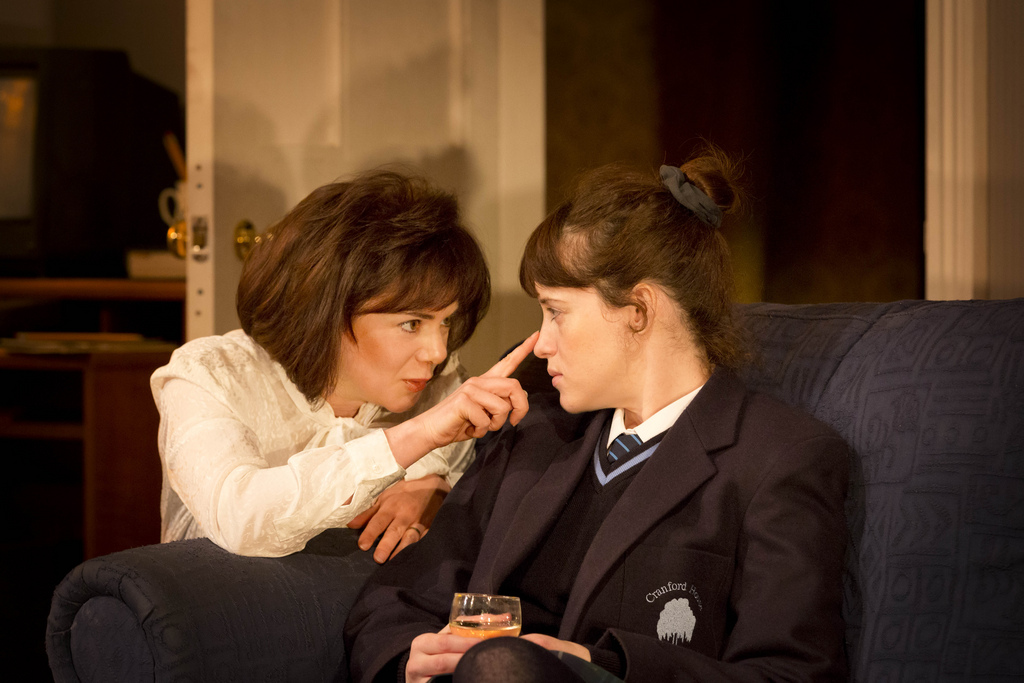 Love, Love, Love (2012). In Mike Barlett’s played Foy played a child of a hippie baby boomer. “It’s the Philip Larkin thing: she really does believe her parents did fuck her up. I hope I’m not like she is when she’s 37." (Pictured, Foy with Victoria Hamilton)
Love, Love, Love (2012). In Mike Barlett’s played Foy played a child of a hippie baby boomer. “It’s the Philip Larkin thing: she really does believe her parents did fuck her up. I hope I’m not like she is when she’s 37." (Pictured, Foy with Victoria Hamilton)
Macbeth (2013). “Why does everyone think she’s so evil? My approach to every character is you essentially want to understand. They always have something they are fighting against. They have lost a baby and that’s the catalyst for everything.”
Wolf Hall (2015). Foy’s Anne Boleyn goes toe to toe with Mark Rylance and Damian Lewis.
The Crown (2016). Queen of all she surveys. Bring on series two.
rating
Explore topics
Share this article
Add comment
more TV
 Blue Lights Series 2, BBC One review - still our best cop show despite a slacker structure
The engaging Belfast cops are less tightly focused this time around
Blue Lights Series 2, BBC One review - still our best cop show despite a slacker structure
The engaging Belfast cops are less tightly focused this time around
 Baby Reindeer, Netflix review - a misery memoir disturbingly presented
Richard Gadd's double traumas are a difficult watch but ultimately inspiring
Baby Reindeer, Netflix review - a misery memoir disturbingly presented
Richard Gadd's double traumas are a difficult watch but ultimately inspiring
 Anthracite, Netflix review - murderous mysteries in the French Alps
Who can unravel the ghastly secrets of the town of Lévionna?
Anthracite, Netflix review - murderous mysteries in the French Alps
Who can unravel the ghastly secrets of the town of Lévionna?
 Ripley, Netflix review - Highsmith's horribly fascinating sociopath adrift in a sea of noir
Its black and white cinematography is striking, but eventually wearying
Ripley, Netflix review - Highsmith's horribly fascinating sociopath adrift in a sea of noir
Its black and white cinematography is striking, but eventually wearying
 Scoop, Netflix review - revisiting a Right Royal nightmare
Gripping dramatisation of Newsnight's fateful Prince Andrew interview
Scoop, Netflix review - revisiting a Right Royal nightmare
Gripping dramatisation of Newsnight's fateful Prince Andrew interview
 RuPaul’s Drag Race UK vs the World Season 2, BBC Three review - fun, friendship and big talents
Worthy and lovable winners (no spoilers) as the best stay the course
RuPaul’s Drag Race UK vs the World Season 2, BBC Three review - fun, friendship and big talents
Worthy and lovable winners (no spoilers) as the best stay the course
 This Town, BBC One review - lurid melodrama in Eighties Brummieland
Steven Knight revisits his Midlands roots, with implausible consequences
This Town, BBC One review - lurid melodrama in Eighties Brummieland
Steven Knight revisits his Midlands roots, with implausible consequences
 Passenger, ITV review - who are they trying to kid?
Andrew Buchan's screenwriting debut leads us nowhere
Passenger, ITV review - who are they trying to kid?
Andrew Buchan's screenwriting debut leads us nowhere
 3 Body Problem, Netflix review - life, the universe and everything (and a bit more)
Mind-blowing adaptation of Liu Cixin's novel from the makers of 'Game of Thrones'
3 Body Problem, Netflix review - life, the universe and everything (and a bit more)
Mind-blowing adaptation of Liu Cixin's novel from the makers of 'Game of Thrones'
 Manhunt, Apple TV+ review - all the President's men
Tobias Menzies and Anthony Boyle go head to head in historical crime drama
Manhunt, Apple TV+ review - all the President's men
Tobias Menzies and Anthony Boyle go head to head in historical crime drama
 The Gentlemen, Netflix review - Guy Ritchie's further adventures in Geezerworld
Riotous assembly of toffs, gangsters, travellers, rogues and misfits
The Gentlemen, Netflix review - Guy Ritchie's further adventures in Geezerworld
Riotous assembly of toffs, gangsters, travellers, rogues and misfits
 Oscars 2024: politics aplenty but few surprises as 'Oppenheimer' dominates
Christopher Nolan biopic wins big in a ceremony defined by a pink-clad Ryan Gosling and Donald Trump seeing red
Oscars 2024: politics aplenty but few surprises as 'Oppenheimer' dominates
Christopher Nolan biopic wins big in a ceremony defined by a pink-clad Ryan Gosling and Donald Trump seeing red

Comments
...
...
...
...